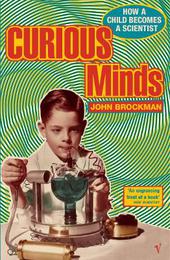
|
Curious Minds: How a Child Becomes a Scientist
Paperback / softback
Main Details
| Title |
Curious Minds: How a Child Becomes a Scientist
|
| Authors and Contributors |
By (author) John Brockman
|
| Physical Properties |
| Format:Paperback / softback | | Pages:256 | | Dimensions(mm): Height 198,Width 129 |
|
| Category/Genre | History of science |
|---|
| ISBN/Barcode |
9780099592877
|
| Classifications | Dewey:509 |
|---|
| Audience | | Tertiary Education (US: College) | | Professional & Vocational | |
|---|
|
Publishing Details |
| Publisher |
Vintage Publishing
|
| Imprint |
Vintage
|
| Publication Date |
5 November 2013 |
| Publication Country |
United Kingdom
|
Description
Some of the world's greatest scientists reveal how they discovered their vocation and became committed to a life of science. Curious Minds is a book of original, autobiographical essays by twenty-seven scientists, including Paul Davies, Richard Dawkins, Daniel C. Dennett, Freeman Dyson, Murray Gell-Mann, Nicholas Humphrey, Lynn Margulis, Steven Pinker and Robert M. Sapolsky. Each writer attempts to identify that moment or those influences in his or her youth which triggered the determination to become a scientist. Was there a particular event or set of circumstances? To what extent did parents, peers of teachers contribute? Why mathematics rather than psychology; why biology rather than physics? What were the turning points, mistakes, epiphanies? Personal, passionate, revealing, enthralling, Curious Minds tells as much about life as it does about science.
Author Biography
John Brockman is founder and CEO of Brockman, Inc., an international literary and software agency; president of Edge Foundation, Inc.; publisher and editor of Edge, a Web site presenting the third culture in action; and co-founder of rightscenter.com, Inc., an Internet company. He is the author and/or editor of four books about science. He lives in New York.
ReviewsAn engrossing treat of a book... Crammed with hugely enjoyable anecdotes...You'll have a wonderful time reading these reminiscences * New Scientist * These essays offer the idiosyncrasy and curiosity value that we expect of good, narrative history, combined with much fine writing... Absorbing and persuasive in just the way good stories are * Nature * consistently enthralling memoirs by leading thinkers...the result is a remarkably dud-free collection * Observer *
|